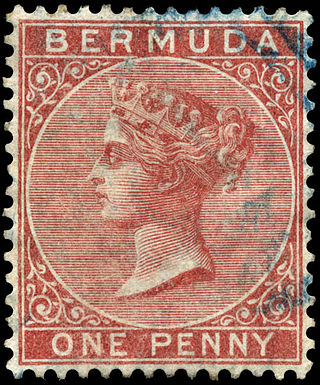Related Research Articles

Philately is the study of postage stamps and postal history. It also refers to the collection and appreciation of stamps and other philatelic products. Philately involves more than just stamp collecting or the study of postage; it is possible to be a philatelist without owning any stamps. For instance, the stamps being studied may be very rare or reside only in museums.

Indian postal systems for efficient military and governmental communications had developed long before the arrival of Europeans. When the Portuguese, Dutch, French, Danish and British conquered the Marathas who had already defeated the Mughals, their postal systems existed alongside those of many somewhat independent states. The British East India Company gradually annexed the other powers on the sub-continent and brought into existence a British administrative system over most of modern-day India, with a need to establish and maintain both official and commercial mail systems.

Postage stamps and postal history of Great Britain surveys postal history from the United Kingdom and the postage stamps issued by that country and its various historical territories until the present day.

This is a survey of the postage stamps and postal history of the Northern Nigeria Protectorate.

The Edward VIII postage stamps are a definitive stamp series issued in the United Kingdom during the 20 January – 10 December 1936 reign of King Edward VIII.

John Harry Robson Lowe was an English professional philatelist, stamp dealer and stamp auctioneer.
John Alexander Tilleard was a British solicitor and the philatelist who was the first curator of the Royal Philatelic Collection.

Sir Edward Denny Bacon was a British philatelist who helped with the enlargement and mounting of collections possessed by rich collectors of his time and became the curator of the Royal Philatelic Collection between 1913 and 1938.
Admirals are a series of definitive stamps issued by three countries of the British Commonwealth that show King George V of Great Britain and the British Dominions. The stamps are referred to as the Admirals because King George is depicted in his Admiral of the Fleet uniform. The stamps were issued by Canada in 1911–1928, New Zealand in 1926, and Rhodesia in 1913–24.
The United States Stamp Society (USSS) is the largest philatelic organization dedicated to the research and study of United States postage and revenue stamps. The Society is a non-profit collector-based organization with a world-wide membership of over 1700. The USSS is Affiliate #150 of the American Philatelic Society (APS). Since 1930 the Society has encouraged philatelic study through voluntary membership in specialized committees, including those for specific stamp issues like the Washington-Franklins, the Prexies or the Liberty Series, and areas of U.S. philately such as Plate Numbers, Marginal Markings, Private Vending and Affixing Perforations, Booklets and Panes, and Luminescence. Research is made available through published books, research papers and articles in the monthly journal, The United States Specialist.

This is a survey of the postage stamps and postal history of Gibraltar.
Antigua was discovered by Christopher Columbus, in 1493, and was named after the church of Santa Maria la Antigua in Seville. It was first settled in 1632. By the Treaty of Breda in 1667 it became a British Possession.
Belize started as the colony of British Honduras, formally established in the 17th century but disputed through the 18th century.

Key type stamps are stamps of a uniform design that were widely used by colonial territories in the 19th and 20th centuries.

This is a survey of the postage stamps and postal history of Saint Helena.

This is a survey of the postage stamps and postal history of Sierra Leone.

Bermuda, a group of islands in the North Atlantic Ocean, was previously uninhabited when the British established a settlement in 1612.

The British Library Philatelic Collections is the national philatelic collection of the United Kingdom with over 8 million items from around the world. It was established in 1891 as part of the British Museum Library, later to become the British Library, with the collection of Thomas Tapling. In addition to bequests and continuing donations, the library received consistent deposits by the Crown Agency and has become a primary research collection for British Empire and international history. The collections contain a wide range of artefacts in addition to postage stamps, from newspaper stamps to a press used to print the first British postage stamps.
Lionel William Fulcher B.Sc. was a British philatelist who co-edited, with Stanley Phillips, Gibbons Stamp Monthly, was Vice President of the International Philatelic Union and was a key figure in the Fiscal Philatelic Society. He was an expert on the early stamps of Japan and also studied Venezuela, Peru, Nicaragua, Papal States and Norway.
Eric Peter Yendall is a British philatelist who, in 2009, was awarded the Crawford Medal by the Royal Philatelic Society London for his work King George VI large key type revenue and postage high value stamps 1937-1953.
References
- ↑ The Society's medals and honorary fellowship. London: The Royal Philatelic Society London, 2009, p. 5.